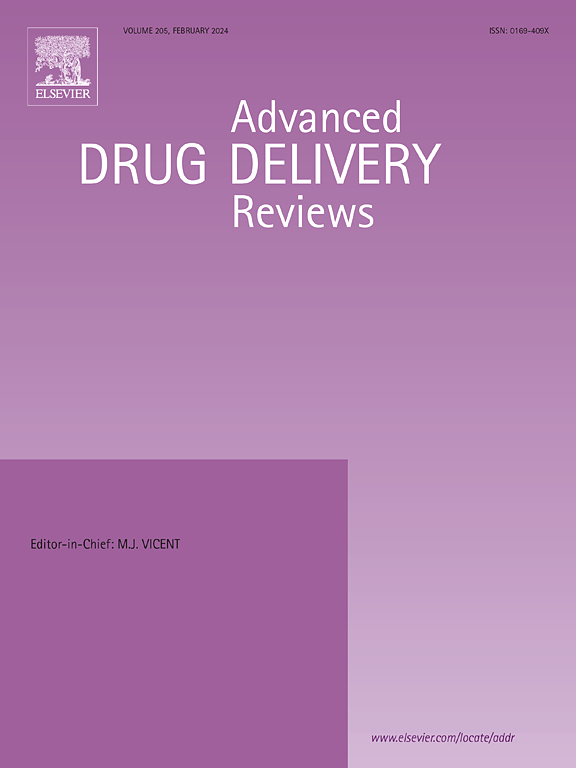Smart drug delivery platforms reprogramming cancer immune cycle to mitigate immune resistance of pancreatic tumors
IF 17.6
1区 医学
Q1 PHARMACOLOGY & PHARMACY
引用次数: 0
Abstract
Immunotherapy has emerged as a promising strategy for pancreatic ductal adenocarcinoma (PDAC) therapy, yet its clinical efficacy suffers from the immunosuppressive tumor microenvironment (ITM). This ITM contributes to immune resistance by impeding the cancer immune (CI) cycle at multiple stages, including impaired antigen release and presentation, inadequate T cell priming and activation, restricted T cell infiltration, and compromised T cell cytotoxicity within the tumor. To address these challenges, smart drug delivery systems have emerged as a transformative strategy to precisely modulate the CI cycle, thereby reversing the ITM and restoring the anti-tumor immunity. In this review, we systematically dissect the clinical landscape of PDAC immunotherapy, outline key mechanisms of impaired CI cycle to drive immunotherapy resistance, and explore smart drug delivery platforms for reinitiating CI cycle. We further discuss the latest preclinical advances of precisely engineered drug delivery systems, and provide a perspective on their potential to harness the CI cycle and overcome immunotherapy resistance in PDAC. This review not only summarizes current progress but also provides a forward-looking perspective on next-generation immunotherapies, emphasizing the role of neuro-immune interactions and the rational design of spatiotemporally tunable, circadian rhythm-adaptable drug delivery systems.


智能给药平台重新编程癌症免疫周期以减轻胰腺肿瘤的免疫抵抗
免疫治疗已成为治疗胰腺导管腺癌(PDAC)的一种很有前景的策略,但其临床疗效仍然受到深度免疫抑制肿瘤微环境(ITM)的严重限制。这种ITM通过在多个阶段阻碍癌症免疫(CI)周期来促进免疫抵抗,包括抗原释放和呈递受损、T细胞启动和激活不足、T细胞浸润受限以及肿瘤内T细胞毒性受损。为了应对这些挑战,智能给药系统已经成为一种革命性的策略,可以精确调节CI周期,从而逆转ITM并恢复抗肿瘤免疫。在这篇综述中,我们系统地剖析了PDAC免疫治疗的临床前景,概述了受损的CI周期驱动免疫治疗耐药的关键机制,并探索了重新启动CI周期的智能给药平台。我们进一步讨论了精确工程药物输送系统的最新临床前进展,并提供了它们利用CI周期和克服PDAC免疫治疗耐药的潜力的观点。这篇综述不仅总结了目前的进展,而且提供了下一代免疫治疗的前瞻性观点,强调神经免疫相互作用的作用和合理设计时空可调、昼夜节律适应性强的药物传递系统。
本文章由计算机程序翻译,如有差异,请以英文原文为准。
求助全文
约1分钟内获得全文
求助全文
来源期刊
CiteScore
28.10
自引率
5.00%
发文量
294
审稿时长
15.1 weeks
期刊介绍:
The aim of the Journal is to provide a forum for the critical analysis of advanced drug and gene delivery systems and their applications in human and veterinary medicine. The Journal has a broad scope, covering the key issues for effective drug and gene delivery, from administration to site-specific delivery.
In general, the Journal publishes review articles in a Theme Issue format. Each Theme Issue provides a comprehensive and critical examination of current and emerging research on the design and development of advanced drug and gene delivery systems and their application to experimental and clinical therapeutics. The goal is to illustrate the pivotal role of a multidisciplinary approach to modern drug delivery, encompassing the application of sound biological and physicochemical principles to the engineering of drug delivery systems to meet the therapeutic need at hand. Importantly the Editorial Team of ADDR asks that the authors effectively window the extensive volume of literature, pick the important contributions and explain their importance, produce a forward looking identification of the challenges facing the field and produce a Conclusions section with expert recommendations to address the issues.

 求助内容:
求助内容: 应助结果提醒方式:
应助结果提醒方式:


